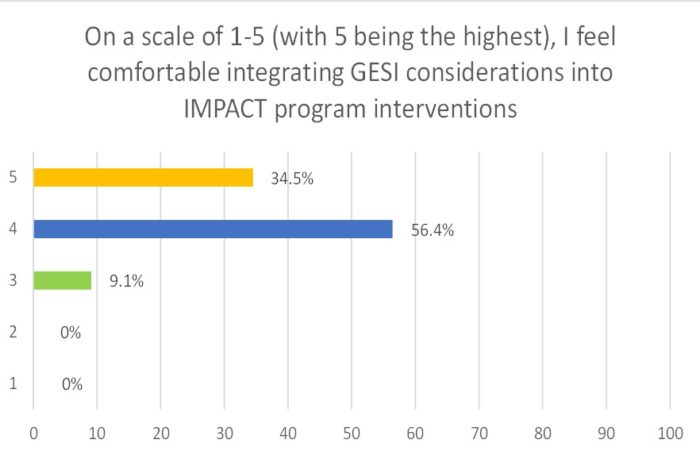Advancing Gender Equality and Social Inclusion in Health Virtually
The global COVID-19 pandemic has impacted populations across the globe. In Madagascar, where the state of emergency resulted in a near “lockdown”, health activities such as those supported by the United States Agency for International Development (USAID)-funded Improving Market Partnerships and Access to Commodities Together (IMPACT) program faced—and continue to face—setbacks. With the duration of the pandemic uncertain, organizations and projects across the country had to think strategically about ways to overcome challenges and continue to work towards planned goals and objectives. One of IMPACT’s overarching objectives is to support capacity development for staff to better understand and be able to apply a gender equality and social inclusion (GESI) lens to their work in order to help magnify the results of the program’s total market approach (TMA). These GESI trainings were typically an in-person, multi-day event; however, after the pandemic hit, IMPACT pivoted to a virtual video-based platform, allowing the trainers to reach diverse technical teams and leadership while prioritizing the safety of all participants.
To carry out this new initiative, Banyan Global’s IMPACT GESI team produced a series of four independent and sequential technical content videos, collectively referred to as the 2020 GESI Refresher Training Series. Each video provided technical information related to integrating GESI into program work, with knowledge checks at the end of each video and a final evaluation for trainees at the end of the series. In planning for the series, the team had to consider many elements of the training that could impact its efficiency and utility, such as language, video duration, period of time necessary to complete the course, and the best platform on which to present the course. Ultimately, the team decided to offer the training videos in both French and English to allow staff the option of taking the course in a language they were more comfortable with, especially when it came to practicing technical concepts. The videos were intentionally short to both serve as a refresher but also to account for trainees’ attention spans and time needed for content absorption. Staff had a three-week window to complete the training to maximize opportunities to staff to set their own schedules. The GESI team decided to use Google Forms for its analytic capabilities (for example, post-test results were automatically recorded and uploaded to the dashboard when someone completed the course) and to leverage its no-cost option.
As of September 30, 2020, 56 staff members from IMPACT’s five consortium partners, including 12 leaders and their teams, had completed the full GESI refresher training.

In addition to the individual results, the training’s final evaluation revealed positive impacts on the entire IMPACT team: 54.5 percent of the respondents strongly agreed (rated 5 out of 5) and 36.4 percent agreed (rated 4 out of 5) that the GESI trainings are relevant to achieve the objectives of the IMPACT program. Furthermore, after the refresher series, 90.9 percent of the respondents shared that they felt comfortable integrating GESI into their interventions. Feedback from one team lead supports the impact of the training, “For our interventions, I think it is now essential to consider this gender aspect in our various missions in the provinces. [We must] adapt each intervention according to the region, culture, and mode of operation in each place visited. This will then make it possible to identify the various barriers and constraints linked to access to health products in certain places in Madagascar”.
Following the success of the refresher training, IMPACT will now explore opportunities to expand the training to regional staff and partners and continue to leverage virtual opportunities to build capacity in gender equality and social inclusion integration to support programmatic goals and improved TMA.
